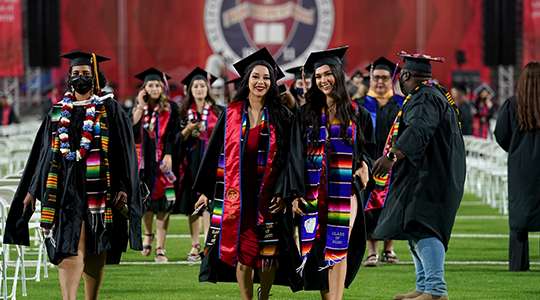Louis Stokes Alliance for Minority Participation
Welcome to California State University Louis Stokes Alliance for Minority Participation
The CSU-LSAMP program is aimed at increasing the quality and quantity of students successfully completing science, technology, engineering and mathematics (STEM) baccalaureate degree programs, and increasing the number of students interested in, academically qualified for and matriculated into programs of graduate study.CSU-LSAMP supports sustained and comprehensive approaches that facilitate achievement of the long-term goal of increasing the number of students who earn doctorates in STEM fields, particularly individuals who have faced or face social, educational or economic barriers to careers in STEM.
Unique to our Program

Bridge to Doctorate
Participating students will focus on activities that will enhance their preparation for PhD studies in science, technology, engineering and mathematics (STEM).
Bridge to Doctorate
Our Students
The CSU-LSAMP Program for Recognition of Undergraduate Distinction (CSU-LSAMP PROUD) is a program designed to recognize and highlight the achievements of our outstanding students.
Meet Our ScholarsInitiated in 1994, with support from the National Science Foundation, the California State University Louis Stokes Alliance for Minority Participation (CSU-LSAMP) Program is a comprehensive statewide project dedicated to increasing the number of students who have faced or faces social, educational or economic barriers graduating from campuses of the California State University with baccalaureate degrees in science, technology, engineering, and mathematics (STEM) disciplines.
The CSU-LSAMP Alliance, with NSF support, was initiated among 16 campuses and has gradually expanded to include all 23 full-service comprehensive universities in the CSU.
To broaden participation of LSAMP students in graduate study, CSU-LSAMP has also established Bridge to the Doctorate (BD) Fellowship opportunities.
The Louis Stokes Alliances for Minority Participation (LSAMP) program is one of a sequence of NSF programs which seek to build productive capacity and output within institutions with significant enrollments of individuals who have faced or faces social, educational or economic barriers to careers within Science, Technology, Engineering, and Mathematics (STEM) professionals.
The program goals are accomplished through the formation of alliances. Phase I awards placed emphasis on aggregate baccalaureate production. Phase II awards augmented the Phase I emphasis with attention to individual student retention and progression to baccalaureate degrees. Phase III awards augmented the Phase I and Phase II emphases with attention to aggregate student progression to graduate school entry. Senior level awards augment the Phase I, Phase II, phase III. Senior level will also provide opportunities for international research and conferences in addition to many other support activities for students.
Success of the LSAMP program has been measured by its ability to cause a significant increase in the number of students, particularly those who have faced or faces social, educational or economic barriers, who graduate with baccalaureate degrees in STEM fields.
- Objective 1- Academic Integration: Support students at critical transition points in their STEM careers (e.g. entering as freshmen, transferring from community college, declaring a major in a STEM discipline) and in “gatekeeper” courses in STEM with the goal of improving student performance and persistence in STEM.
- Objective 2 - Professionalization: Provide opportunities for students to engage in research projects, internships, international activities, conferences, and graduate school preparation activities with the goal of increasing the number of students entering graduate programs and professional careers in STEM.
- Objective 3 - Social Integration: On-going exposure to experiences and opportunities that are important for socialization into science and activities that build a sense of community within STEM disciplines.
LSAMP Program Activities include but not limited to the following:
- Academic Excellence Workshops (AEW) in Science, Engineering, or Mathematics
- LSAMP Student Meetings
- Orientation for new LSAMP StudentsSummer and Academic Year Research Training Program
- Information regarding internship opportunities
- International Activities
- Peer Mentoring
- Presentation/Publication of Research
- Travel Funds to Present/Attend Conferences
- Graduate School Preparation Activities
- LSAMP Academic and Career Advisement Communication
- CSU-LSAMP Statewide Recognition - PROUD Scholars
- Free help in science, engineering and mathematics courses – LSAMP provides group facilitators (advanced students who have received grades of A or B in courses they are facilitating)
- Travel funds, stipends & reimbursement of other costs (i.e., travel to present or attend local, regional and national conferences, graduation application fees; some tests; some texts; graduate school application fees) – amount of stipends and funding is dependent on level of participation, specific program activity, and academic performance
- Eligibility to participate in the LSAMP Bridge to Doctorate Program - Two year graduate fellowship that covers the cost of tuition and fees, and provides funds for a stipend, supplies and travel.
Visit CASA (Center for Access to Science for All)
CASA provides a supportive environment and resources for
 students interested in science, technology, engineering, mathematics and/or targeted
health professions.
students interested in science, technology, engineering, mathematics and/or targeted
health professions.Office Hours
CASA student area is available for studying and building community during regular office hours.
Virtual Office hours are available upon request.
Please contact office for Zoom meeting link.
Connect With Us
Office Operation Hours:
Monday-Friday
8:00 am - 5:00 pm
Office location: CASA
Science I
Room 101
Mail Box:
Science I building
Room 136 (ARC)
Acknowledgements
CSU-LSAMP is funded through the National Science Foundation (NSF) under grant #HRD-1826490 and the Chancellor's Office of the California State University. Any opinions, findings, and conclusions or recommendations expressed in this material are those of the author(s) and do not necessarily reflect the views of the National Science Foundation or the Chancellor's Office of the CSU.